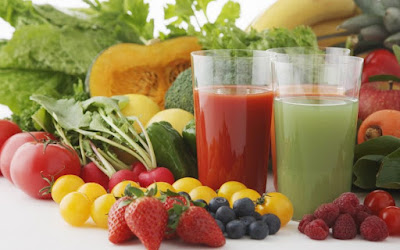Juicing seems to be one of the newer health crazes in Nigeria, with juice bars popping up in almost every city these days, people are trying out juice-cleanses to shed pounds, detox, or just add a nutrient-packed snack to their diets.
Health practitioners are encouraging people to do one simple thing – eat more fruits and vegetables because the thought that we can obtain all of our nutritional needs from our diets alone is now somewhat of a long lost dream. The recommendation is to eat five servings of fruit and three servings of vegetables a day; in reality most people only eat three and one in five people eats barely any fruit at all. Missing out on fruits and vegetables can have long term consequences. The health benefits of juicing are immense for adults and children. Studies confirm that juicing can reduce your risk of cancer, boost your immune system, help you remove toxins from your body, help your digestion, and aid in weight loss. This trend couldn’t have come at a better time.
If you’re interested in trying out juicing or a juice cleanse, it’s important to understand the purpose of juicing, its benefits, and the best way for you to incorporate juice into your diet.
Juicing is simply extracting the juice from whole fruits and vegetables. It’s an easy way to get more fruits and vegetables into your diet since some nutrients are lost while cooking so eating or drinking them raw is really the best way to get all the beneficial vitamins and minerals.
Juicing removes the insoluble fibre from vegetables and fruits. While fibre is an established, important part of an overall healthy diet, removing the insoluble fibre allows for increased absorption of specific health promoting phytonutrients including enzymes, while the soluble fibre persists into the juice. In addition, removing the fibre and consuming fruits and vegetables in liquid form, provides a nutrient delivery system to our bodies that allows individuals who would otherwise have difficulty consuming whole vegetables the opportunity to reap the numerous benefits vegetables have to offer. For instance, juiced grapes, cranberries, prunes and oranges help end irregularity, often a problem among older people. Cucumber juice is high in silica which strengthens connective tissue, and is good for muscles, bones, cartilage, tendons, bones, ligaments, fingernails, elasticity, complexion, and hair loss. Apple juice can alleviate arthritis and rheumatism and flush out the kidneys and liver while being low in calories.
A good juicing program can also help with weight loss and concentration. Not only will you feel full of energy and vigour, you will look healthier, younger, and feel better overall.
Most dietitians do not recommend a juicing-only weight loss plan because the lack of fibre and protein in juices often leaves one hungry, and at risk for losing too much muscle mass.
However, a healthy way to juice for fat loss is to combine juicing with a balanced nutrition plan, because the body needs more than the nutrients fruits and vegetables provide.
Some argue that juicing is better than eating the actual fruit or vegetable, but there is no sound scientific evidence that extracted juices are healthier than the juice you get by eating the fruit or vegetable itself since all juicing does is extract the vitamins, mineral and phytonutrients found in fresh fruits or vegetables.
When juicing, make only as much juice that can be drank at one time because fresh squeezed juice can quickly develop harmful bacteria. Nutrient levels will also be far higher when you consume a freshly pressed juice, helping to replenish your body with an abundance of antioxidants. Also, when juicing, try to keep some of the pulp. Not only does it have healthy fibre, but it can help fill you up.
Also keep in mind that juices may contain more sugar than most realize, and if consumed without careful consideration, these extra calories can lead to weight gain. It is possible to make fresh juice a regular part of your daily diet, with a little patience, time and perseverance.

No comments:
Post a Comment